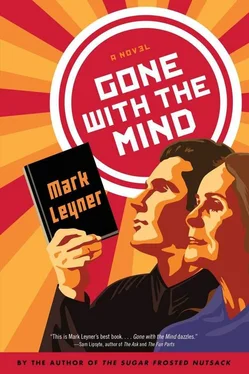Mark Leyner
Gone with the Mind
Hello, my name is Muriel Leyner, and I’m coordinating director of the Nonfiction at the Food Court Reading Series here at the Woodcreek Plaza Mall. This series has been made possible by the generosity of the International Council of Shopping Centers and Douthat & Associates Properties. And I’d like to single out Jenny Schoenhals, the senior general manager at Woodcreek Plaza Mall, who has worked so diligently on providing us with such a commodious venue here at the food court, and without whom none of this would be possible. I see you couldn’t make it tonight, but thank you so very much, Jenny, wherever you are. And last, but certainly not least, I’d like to thank our indispensable sponsors: Panda Express, Master Wok, Au Bon Pain, Auntie Anne’s Pretzels, California Pizza Kitchen, Cinnabon, Jamba Juice, KFC Express, McDonald’s, Nathan’s Famous, Sbarro, Subway, and Taco Bell.
Before I introduce our reader for tonight, I should point out that, because of the heavy rain and the flash-flood warnings that have been issued by the National Weather Service, no one — not one single person — has actually shown up for the reading…except, uh, I see that we’ve got some of the staff of Panda Express and Sbarro with us. I don’t know if you two guys are just taking a break over there or are actually here for the reading…
We’re just taking a break. We’re definitely not here for the reading!
Well, welcome. There’s nothing more dispiriting for a writer than to have traveled hundreds, sometimes thousands of miles to give a reading, and then find him- or herself facing rows of empty seats. So, I’m especially appreciative that you guys braved such inclement weather and at least showed up for work tonight. At least it provides the semblance of an audience.
“I’ve survived two assassination attempts: one on a highway between Sophia and Plovdiv, Bulgaria, on November 11, 2006, and one in front of a hotel in Los Angeles on February 4, 2008. On December 3, 2012, I was raped by a robot on the corner of Fifth Avenue and 101st Street in New York City. In the summer of 2014, desperate for cash and back on crack, I sold the rights to my life story to a start-up indie video-game developer called MirRaj Entertainment (named after its founders, Miriam Rubenstein and Davesh Rajaratnam).” So begins Gone with the Mind, my son’s autobiography, excerpts from which he will be reading tonight.
Mark Leyner was born at the Margaret Hague Maternity Hospital in Jersey City, New Jersey, on January 4, 1956. I was twenty-one years old. During my pregnancy, Mark’s father (my ex-husband, Joel) and I were living in a one-bedroom apartment in a small brick building at 225 Union Street in Jersey City, between Bergen Avenue and the Boulevard. We paid, as I remember, fifty dollars a month in rent. I don’t know why I remember all that so exactly…perhaps because it was our very first apartment. At any rate, about five or six weeks into the pregnancy, I began experiencing terrible, terrible morning sickness. Severe morning sickness. This was at the end of April in 1955. I would throw up all day and all night. (The medical term for this is hyperemesis gravidarum .) And I lost a significant amount of weight. I was down to something ridiculous like eighty-five pounds. My obstetrician-gynecologist, my ob-gyn —although we didn’t abbreviate it back then — was a man named Dr. Schneckendorf. This Dr. Schneckendorf, interestingly enough, had been my own mother’s doctor when she gave birth to me in 1934. And he was a kindly old gent. But nobody really helped with the nausea. Most men, and I’d say especially doctors, looked on it as a form of self-indulgence. I valiantly tried to do everything humanly possible to keep it under control, but…people really thought of it as some sort of psychosomatic malady, almost like a form of malingering, as if I were simply this spoiled Jewish princess. That’s the overwhelming feeling I got from most men, and certainly from most men in the medical profession at that time. At about three months, I began to “feel life,” which is the expression we used then for a mother’s first sensations of the fetus moving around in her uterus. And I could see an outline of his leg sticking out on my right side. He was a very high baby. And I remember being dismayed by what people said — that when you feel life, the nausea would abate — because that certainly didn’t come to pass for me. I was going to NYU at the time — I was finishing up my sophomore year, I think. My father, at one point, had refused to continue paying for my school. He said to me, Well, you went and got married so young, and now you need to go out and work, and you and your husband need to take care of your own financial obligations; I’m not taking care of you anymore. So I went and got a job at a moving and storage company on Ocean Avenue in Jersey City, where I did billing and secretarial work. And I was terrible at it. Terrible! And I went and told my father that I just couldn’t stand being cooped up in that office on Ocean Avenue anymore, and he relented and changed his mind and agreed to help pay for NYU again. But it was very, very difficult for me at that point, given how sick I was feeling just about all the time, throwing up every single day, all day long, and I was missing exams and I was taking Incompletes, and I had no choice but to drop out, essentially. But my husband and I wanted a baby very, very much, and it was also a good time to get pregnant to protect him from the draft — this was only a couple of years after the Korean War. So I tried the best I could to just buck up and get through it. I kept a bowl cradled in one arm to throw up in. I’d spend days at my mother Harriet’s house or she would come over to my house. Afternoons were better, a little better, and I’d try to eat. Chinese food — fried rice — seemed to set better in my stomach. And Mark’s father, after work, would stop at the Jade, which was a Chinese restaurant in Journal Square, and bring me cartons of fried rice. Whenever I felt that I could actually eat something, actually keep something down, I could be very peremptory about it. I remember that summer being down at the Jersey shore, at a beach club in Long Branch, and barking at my sister, Francis, “Get me a well-done hamburger and fries, now!” because I knew how fleeting that appetite could be, and I was absolutely determined to try to stay as healthy and as strong as I possibly could for this baby inside me. That summer we were staying at these little apartments in West Long Branch. There were lots of Jersey City people. And almost every day, the men would go out on fishing boats. And there were rough seas out there. And later in the afternoon, when these guys would get off the boats, they were green, staggering. And I’d say, “Dr. Rubenstein, Uncle Harry, what happened?” I was a fresh kid. I had a fresh mouth. “Uncle This and Uncle That, what happened out there? You don’t look so good.” The fact that they were so seasick, so nauseous, delighted me to no end. Because as far as they were concerned, my terrible, relentless nausea was all in my mind. “If you kept yourself busy. Maybe if you had more floors to wash.” They were all such imperious chauvinists. “If you continue this, we’re going to have to put you in the hospital and feed you intravenously.” Believe me, if this were an ailment of men’s testicles, they would have found a treatment, a cure for it a thousand years go. But they didn’t give a flying fuck. I got vitamin B shots from a doctor who was a friend of my husband, and that helped a bit. But that’s about it. Other women would tell me that morning sickness was a sign of a healthy pregnancy, which was certainly a consolation. And I think that I endured it all with a genuine sense of martyrdom, determined to persevere, in the face of all the sexist, condescending bullshit, for the sake of my baby, for Mark’s sake. And so, that first week in January of 1956, the third, on a Tuesday, my water broke. And Dr. Schneckendorf said come right into the hospital. I remember it was snowy and I had my little bag with me. And Schneckendorf and all the residents told me, “What you need to do is walk. Walk up and down on the hall.” So I walked up and down on the hall. I had my robe — a pale blue-and-white-printed corduroy robe with white linen embroidered collar and cuffs. Buttoned down the front. Like a college girl’s. Slippers. Long, fair hair in a ponytail. And I’m walking, walking, walking…and the pain is getting a bit worse, but I’m thinking,
Читать дальше












